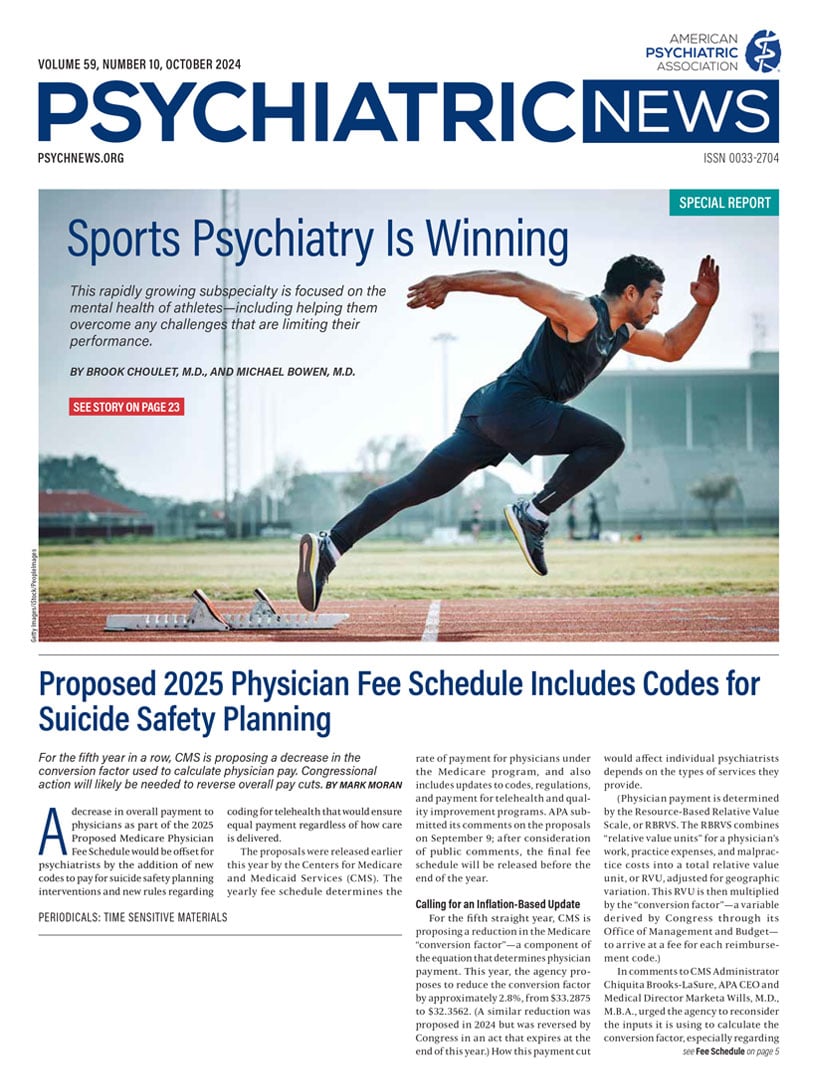Boosting participation by psychiatrists and other mental health clinicians in public health insurance plans will require the government to provide better reimbursement rates, easier enrollment, enhanced training, and fewer administrative hassles, according to a new report from the National Academies of Sciences, Engineering, and Medicine.
The culmination of a year-long effort by a committee of experts in mental health, including several APA members, the report was sponsored by the Substance Abuse and Mental Health Services Administration (SAMHSA) and the Centers for Medicare and Medicaid Services (CMS). The committee surveyed clinicians and held public meetings to solicit input from a wide array of behavioral health clinicians, peer support specialists, individuals with lived experience with mental illness, and their caregivers.
The goal was for the report to serve as a blueprint for increasing behavioral health provider participation in Medicare, Medicaid, and Marketplace insurance plans. “We were very pleased with the report and its detailed analysis,” said APA Past President Anita Everett, M.D., director of SAMHSA’s Center for Mental Health Services.
“We at SAMHSA together with CMS have already started creating our action plan. We will be using the report as a guide to map out the steps we can take at the federal level.”
How Reimbursement Is Done
“Usually, these reimbursement rates and other policies set by Medicare and Medicaid trickle down to private insurance networks as well,” said committee member John Torous, M.D., director of the digital psychiatry division in the psychiatry department at Beth Israel Deaconess Medical Center. That is why it is particularly important for psychiatry to have a voice and help guide these public programs, Torous told Psychiatric News.
Even before the committee’s first meeting, Torous knew the answer to boosting clinicians’ uptake of public health insurance: increase reimbursement rates. “If you offer the lowest rate in town, it’s going to be harder to get clinicians to participate,” said Torous, who also serves as a staff psychiatrist and assistant professor at Harvard Medical School.
Yet CMS’ Medicare Physician Fee Schedule for 2025, proposed in July, is slated to cut payments to doctors for the fifth straight year (see story
here). Absent congressional intervention, physicians who accept Medicare will earn 2.8% less starting Jan. 1. This, despite an estimated 3.6% increase in the costs of running a practice due to inflation, as measured by the Medicare Economic Index.
“Permeating our report is the idea that we need to think in broad ways about how reimbursement is done,” Torous said. For example, rather than continuing today’s fee-for-service model, the committee discussed moving toward value-based contracts, under which reimbursement would be based on care of a population and the health outcomes delivered.
Streamlining the System
Everett called physician reimbursement rates “a part of it, but not the whole picture” for boosting participation in public plans. She said one key recommendation was to expand training opportunities to give trainees the chance to work with individuals with both complex mental illnesses and deficits involving social determinants of health—in settings where patients’ needs are well met.
One way to do this is for the more than 500 certified community behavioral health clinics now operating nationwide to boost awareness of their clinician training opportunities and align with local training programs. “This type of exposure could result in greater interest in working with this population,” Everett said. The committee also recommended allowing trainees, most of whom now do this type of on-the-job practical learning for no pay, to bill public insurance for their services, she said.
Another one of the committees’ recommendations is to make it easier for clinicians to be credentialed and enroll as a public insurance provider. Allowing cross-state licensing for psychiatrists, as was permitted during the pandemic, could also improve access. It would allow, for example, a psychiatrist who lives in an area with many clinicians, such as Maryland, to provide telehealth services for a patient in Idaho, Everett said.
Torous said public health plans must also cut red tape surrounding clinician reimbursement, streamline billing, and provide more clinician support. For example, he said the government needs to create a standardized digital infrastructure platform that could prompt clinicians to easily complete public insurance documentation requirements, which would be a boon, particularly for private practitioners.
Such a digitized system would also allow for standardized technology training for clinicians and, perhaps most importantly, for automated billing to public plans, Torous said. He pointed as an example to the standardized technology platform that is used in every Veterans Administration hospital across the country. “It’s a huge advantage for veteran care,” he said.
Right now, providers who accept Medicare or Medicaid clinicians must source their own electronic health record and telehealth systems—each with its own features and pricing. Clinicians are left to “figure out billing and everything else on their own and make it all work,” Torous said. “That can make it challenging for psychiatrists and other clinicians to work across different systems or to work part-time in more than one place.”
The Background
Public health insurance plans serve more patients with mental illness or substance use than most private insurance plans, according to the report. In fact, Medicaid is the single largest payer for behavioral health care services in the United States.
Yet psychiatrists are significantly less likely to participate in public insurance plans than are other physician specialties, and the distribution of these professionals across the U.S. remains misaligned with patient needs, the report noted. Mental health clinician shortages are greatest in rural areas of the country.
Although more recent data is hard to come by, a study published in Health Affairs in 2017 found that on average 11% of all mental health care providers practicing in a given state participated in one of the nation’s 531 unique marketplace insurance plan networks. Clinician participation in mental health networks was low, compared with that of primary care physicians: Only 43% of psychiatrists and 19% percent of other mental health care providers participated in any network.
The 265-page National Academies report includes specific recommendations for CMS:
•
Make participation worthwhile for MH clinicians: Provide guidance to states on setting reimbursement rates that better account for the actual cost of care, use regulatory and incentive structures to ensure prompt payment, stop inappropriate denial of claims, and reduce administrative burdens—for example, halt prior authorization for “low value” services that don’t cost much.
•
Promote and ease MH clinician entry into public insurance: Streamline credentialing and enrollment processes, set guidelines for telemedicine coverage and establish its reimbursement rate, expand access to care by allowing licensing across state lines, and provide incentives to support career choices in behavioral health.
•
Improve plan performance and accountability: Develop standards for managed care plans within Medicare and Medicaid that carry significant penalties and bonuses based on behavioral health outcomes. Invest in improved quality measures and tie them to plan payment.
Everett said that some of the committee’s recommendations, particularly those involving new funding, would require congressional action. In addition, the changes involving Medicaid, which is a state program, must be acted on at the state and local levels. ■


